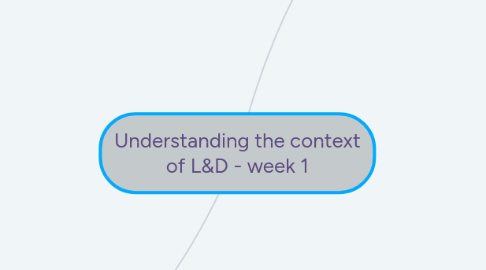
1. Getting to know the organisation
1.1. Learning philosophy (the vision for the organisations learning provision)
1.1.1. Foundation Questions: When, Where, What, Who, Why
1.1.2. The 12 key things which underpin how effective learning is decided and facilitated using evidence based insights
1.2. The 'Golden Thread' (the link between organisational strategy and goals)
1.2.1. Fully understand organisations mission statement
1.2.2. Regularly ask yourself: 1) Wha day to day performance problem is this helping to address? 2) What organisational goal or stagy is this contributing towards?
1.3. Understand your organisation
1.3.1. Evolution (how it behaves when confronted with change)
1.3.1.1. adaptive - changing size and practice in response to the world around it
1.3.1.2. dynamic - growing larger but with relatively little change in practice
1.3.1.3. Static - fixed in both size and practice
1.3.2. Production focus
1.3.2.1. Service
1.3.2.2. Product
1.3.3. Age
1.3.3.1. Start-up
1.3.3.2. Immature
1.3.3.3. Mature
1.3.4. Ownership
1.3.4.1. Private
1.3.4.2. Public
1.3.4.3. Voluntary Franchise
1.3.5. Reach
1.3.5.1. Local
1.3.5.2. National
1.3.5.3. Regional
1.3.5.4. Global
1.3.6. Client Focus
1.3.6.1. Business to customer
1.3.6.2. Business to business
1.4. Delivery Channel
1.4.1. Online
1.4.2. Face to face
1.4.3. Blended
2. L&D specific
2.1. L&D Barriers
2.1.1. Time constraints
2.1.2. Keeping knowledge current
2.1.3. Regulatory/compliance
2.1.4. Cost challenges
2.1.5. Learning culture/mindset
2.2. Ways to overcome challenges
2.2.1. Gamification
2.2.2. Bitesized learning
2.2.3. Variety of channels
2.2.3.1. Face to face
2.2.3.2. E-Learning
2.2.3.3. Blended
2.2.3.4. In flow of work coaching
2.2.3.5. MOOCs
2.2.4. Formal or informal options
2.2.5. 70/2/10 rule
2.2.5.1. 70% job related (in flow of work)
2.2.5.2. 20% interactions with others (social learning, coaching, mentoring, collaborative learning)
2.2.5.3. 10% educational events (traditional courses and educational events)
2.2.6. Outsourcing
2.2.7. SME engagement
